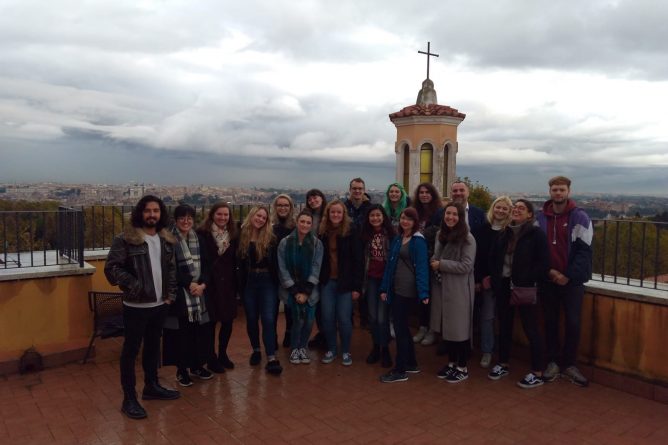This month, MA students from the Rome School of Classical and Renaissance Studies were led on a three-day university-funded visit to Italy’s capital, their future destination of study.
The purpose of this annual taster trip, a fundamental part of the School’s specialist programmes and the unique student experience they propose, is simple; prepare students as fully as possible for their term in Rome. Knowing what to expect from the outset means students are ready to embrace life and study abroad in all its fullness, making for an enriching academic chapter ahead.
As in previous cycles, the trip’s colourful itinerary saw students (accompanied by school teaching and administrative staff) visit monuments, tour the study facilities on offer to them through the American University of Rome and the American Academy, and enjoy a hearty Roman meal together – quite literally giving a taste of ‘la dolce vita’ to come.
This year’s guided tours of Castel Sant Angelo and the Capitoline Museums given by the department’s lecturers and in the latter instance, somewhat exceptionally, also by the curator herself of the ‘Luca Signorelli and Rome: Oblivion and Rediscovery’ exhibition, resembled the hands-on teaching to be expected from term two.
In keeping with the rest of Kent’s European centres, the Rome School prides itself on its matchless education model that transforms the city into the classroom. While a continuum from the teaching (delivered in English) experienced in Canterbury, this embellished spring term framework tangibly takes advantage of Rome’s ancient heritage and abounding history.
Uprooting cities and countries and heading somewhere unfamiliar for study purposes can sometimes seem a big step. Given that more than half of this year’s MA cohort had never visited Rome before, the chance to trial the capital’s transport, explore its neighbourhoods, witness its rich culture and set up accommodation viewings in advance of moving made the November trip a precious preparatory tool.
Much more than a simple study perk, this induction to life in Rome is another means through which Kent supports its students’ transition abroad and helps them feel at ease as, individually and collectively, they enter into new and exciting academic terrain.

